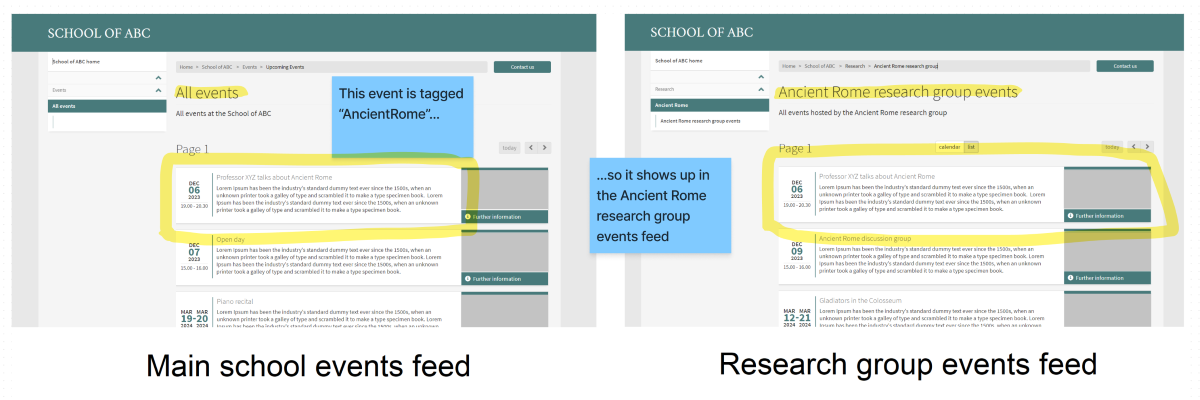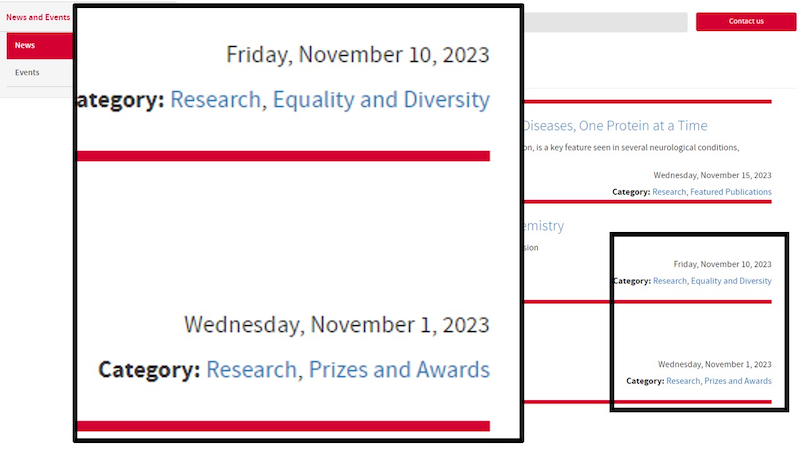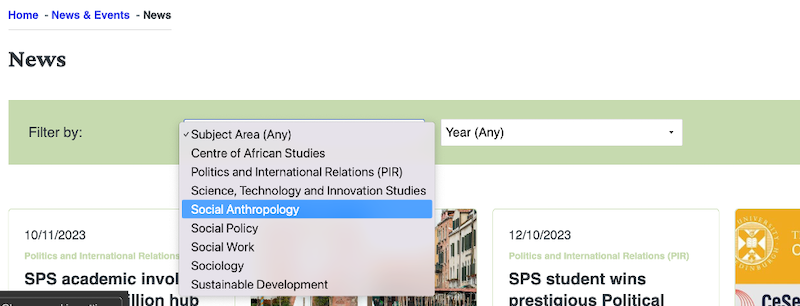Hearing from web publishers about News and Events
Between September and November 2023, we heard from web publishers around the University about their news and events content. This post summarises some of the themes that came out of this research.
Why we did this research
There’s a huge amount of news and events content on University of Edinburgh websites. With the ongoing development of EdWeb 2, we’ve been exploring how we might display news and events in future versions of the platform. To help us with this, we carried out user research to improve our understanding of what web publishers need from their Content Management System (CMS).
In this project, we wanted to learn:
- what publishers are aiming to achieve with news and events content
- what the current experience of publishing news and events is like
- which CMS features and functionality might be useful for publishers when working with news and events
What we did
Interviews
We heard from 25 web publishers from across the University, most of whom are based in schools, with others working in research institutes and non-academic departments. The interviews took place over Microsoft Teams, with each one taking between 15 and 30 minutes. Interviewees shared their screen, logged in to their CMS, and talked us through their experience of putting news and events on the web. In most cases, the CMS being discussed was EdWeb, but we also heard from staff who work with a different CMS.
Thematic analysis
Working from recordings of the interviews, we made notes of publishers’ comments and put them on a Miro board. Then we grouped the notes to highlight any themes we noticed.

We used Miro to group interviewees’ comments by theme.
What we found out
The purpose of news content
We wanted to know more about why various departments around the University publish news on their website.
Publishers described some of the reasons:
- to celebrate interesting activity within the School / Unit
- to demonstrate to the world what our researchers work on
This is partly in the spirit of openness: there’s important, interesting work that happens across the University, and web publishers want to tell people about it.
News also supports marketing, research and outreach activity. Publishers said they use news to:
- highlight interesting, positive stories to prospective students and potential staff, collaborators and funders
- increase the impact of research
- report on progress against strategic aims of the University, as outlined in Strategy 2030
Finally, news stories benefit current staff and students at the University. Visitors to news sections on University sites can learn about staff and students’ work, which raises the profile of that work and the people involved in it.
One interviewee said:
News shouldn’t be a cul de sac. It should be a crossroads leading people to do something with the information.
Other interviewees repeated this sentiment: when they tell an interesting story, they felt they should anticipate what content their readers might want to see next and include links to that on the same page.
This research wasn’t focused on the needs or attitudes of site visitors, but these perspectives invariably came up when we asked publishers about their reasons for having news on their sites. Publishers described analytics data that showed audiences arriving at news stories via social media. They also reported a perception that audiences use news stories to make an assessment of the University or of a particular department. Publishers felt that an active news section of their website makes their department look vibrant, dynamic and interesting. They expressed concern that a quiet news section would make it look like there wasn’t much going on.
Our interviewees talked about how they use news stories and event listings to evidence research activity to funders. For example, when a funding body asks research staff to report back on a project, they can easily show (and link to) the activities they’ve carried out and events they’ve organised. A news section also provides a collection of stories that they can draw on when they need to demonstrate research impact.
How publishers use tags for events
To see what we mean by tags in this context, see:
Drupal CMS: Tagging and feeds (UCL Information Services Division)
It’s currently possible to tag events in EdWeb. You can use these tags to make an event listing appear in multiple feeds across your site.
How to tag events in EdWeb (requires University login)
A typical way publishers use this functionality is to have the same event listed in both a comprehensive, school-wide events page, and in a smaller events feed on a research centre page.
The image below shows how this can work in EdWeb. An event has been given the tag “AncientRome”, which means it shows up on both the “All events” page, and the “Ancient Rome research group events” page.

One publisher said they were looking at using the third-party service Tockify to achieve a similar result.
Publishers told us that managing these tags requires work. They described how they used systems outside of EdWeb to keep track of their tags (Excel and OneNote, for example).
With a small, closely connected web team, it’s easy to make sure that everyone adding events to the site is using a limited set of tags correctly.
But with larger, more distributed web teams, the lead publisher has to keep their colleagues organised. In this case, that might mean sending an email to colleagues at the start of the year reminding everyone what the tags in use are. It also involves troubleshooting when an event goes live on the site without the correct tags.
How publishers use tags for news
We looked at some sites that add tags to news articles. These sites aren’t on EdWeb, but they show some possibilities for how a news overview page can work.
On the School of Chemistry site, tags (called Categories, in this case) are shown to site visitors on the news overview page.

Screenshot of the School of Chemistry news section.
On the School of Social and Political Science website, users can filter the news feed with a small set of tags.
School of Social and Political Science news page

On the School of Social and Political Science website, users can filter the news page using a list of subject areas.
This raised research questions about how site visitors interact with this functionality. That was out of scope for this project, but it would be interesting to know more.
Duplicate news content
Publishers frequently want news stories to appear in multiple places. A news article is published on some other site, but they wanted it to appear on their EdWeb site as well.
This comes up in cases like this:
- “One of our academics has collaborated with an academic from another part of the University. They’ve published a news story on their site and we’d like the same story to appear on our site”
- “There’s a story on one of our sub-sites and we want it on our main site.”
One way to handle this is to clone the original news article and publish it in your own news section. This makes the story appear with your other news articles, which looks tidy and keeps your news section active and interesting. The drawback (which publishers we spoke to were quick to point out) is that you end up with the same story published online twice. There are good reasons to avoid this:
- Duplicate content means you have more content to manage
- Search engines are thought to penalise duplicate content
Duplicate content: Causes and solutions (Yoast.com)
Alternatively, you can leave the canonical single version of the story on a different site. But then there’s no tidy way to make the story appear in news section of your site with the other stories.
Without a simple solution to this problem, publishers were left with making compromises. In some cases, publishers take the hit and publish the duplicate content. In other cases, they leave the canonical version where it is and feel that their news section is missing some key stories.
Archived news and events content
Most of the publishers we heard from keep old news stories online and maintain them in a news archive section of their site. In some cases, publishers are also maintaining archives of past events. These archives typically go back to the last time there was a migration to a new CMS.
In cases where a publisher had deleted old news and events, they reported using analytics data to help them make this decision. To paraphrase one publisher: “We could tell from analytics that hardly anyone was looking at the stories in our archive.”
We asked publishers why they keep old news and events online. They explained:
- We don’t like to break incoming links
- Past event pages can be useful when they contain recordings, slides and handouts
- Sometimes we refer back to old news articles when we write similar stories (“How did we tell this story last time?”)
- Sometimes visiting lecturers refer back to previous events (“What topics have previous guest lecturers covered?”)
- News and events archives are useful when we need to evidence research activity to funders or the Research Excellence Framework.
Next steps
The findings from this project are a great help to us as we work on EdWeb 2, and we’d like to say thanks to everyone who took part. We can now feed this information into any designs for future news and events content types.

